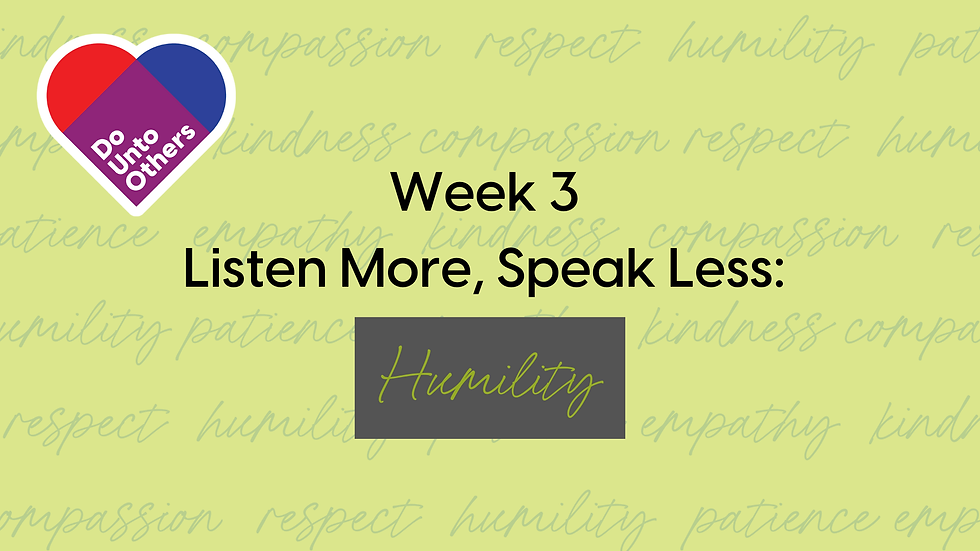“The Polarization Within: Compassion”
- Rev. Annie McMillan
- Sep 14, 2024
- 4 min read
There’s a window in the Church of the Resurrection in Leawood, Kansas. It’s called the resurrection window, and it connects three gardens: the Garden of Eden, the garden where the resurrected Jesus first appeared, and the Garden of the New Jerusalem. We’ll be chatting a little more about the theme of garden in the bible during Wednesday’s Bible Study. One of the neat parts of this window, though, is all of the people who are in it. It includes Adam and Eve and Cain and Abel, King David and Daniel and so many more, all on the left. It includes moments from Jesus' life. And on the right, leading from the Garden of Christ’s resurrection to the garden of the New Jerusalem (heaven), it includes Paul and Augustine and Martin Luther and John Wesley and Mother Teresa and Billy Graham- it includes people from all different theologies throughout history. In this “picture of the church in heaven [we] see Orthodox and Catholics and Protestants included… Methodists and Pentecostals and Baptists, all of them in heaven, all looking to Jesus their Savior and Lord.”
It reminds me of the Isaiah passage: the predator and prey living together in harmony, no discord between them. It’s like Jesus’ disciples. You have Simon the Zealot, and Matthew the tax collector. In one sermon, Rev. Adam Hamilton pointed out that this would be like Jesus “calling a die-hard Republican Trump supporter wearing his or her Make America Great Again hat, and calling a [Kamala Harris], never-Trump Democrat to both be among his twelve disciples.”
In many ways, this is the church. I think many of us are anxious about all of this divisiveness we see today. Estrangement in families. Neighbor versus neighbor. And online bickering and name-calling that never seems to stop. Yet “when it is working well, political alliances and oppositions are all temporary and there can be surprising and joyful friendships. …Supreme Court Justices Scalia and Ginsburg [had] polar opposite legal theories but [shared] a deep …love for the Opera.” Ronald Reagan and Tip O’Neill were often political opponents in the house, but shared a deep respect for each other. If politicians could at one time talk to each other, enjoy a shared common interest or even be dear friends while strongly opposing each other on the issues, then why can’t we?
Time and again, compassion comes up in the gospels: Jesus had compassion on the crowds because they were like sheep without a shepherd. He has compassion and heals; he is moved by compassion and teaches. He tells the parable of the Good Samaritan who had compassion on the man who had been beaten by robbers so that the Samaritan cared for his wounds. He tells the parable of the Prodigal Son whose father is moved by compassion to come out and greet the youngest son when he finally comes home.
Compassion is more than empathy. Empathy means that we feel for someone; we understand their perspective and experience. With empathy, we can imagine where someone is coming from. But empathy doesn’t necessarily mean action. This is where compassion comes in. Compassion means that we then act- we show a love for them. When Adam Hamilton preached on a similar theme, he said “it is a love of actions, of blessing, of showing kindness, of offering care for the other… This kind of love chooses to focus on the humanity we share with others. It searches for the image of God in them. It focuses on what we share in common, not what divides us.”
This can mean compassion for ourselves: we know that Jesus went away by himself time after time, taking care of himself. He called the disciples to come away after sending them off in pairs to preach, heal, and cast out demons. Having sought peace within ourselves, we can more easily have compassion for others.
“Compassion bridges us to another person. … When we have compassion for another person, we strive to see ‘with’ their eyes, hear ‘with’ their ears, understand ‘with’ their perspective. This picture of Isaiah’s ‘peaceable kingdom,’ … is an image of unlikely things sharing time, food, and space ‘with’ one another.”
We have so much more in common than we think. For example: I think everyone can agree that school shootings should not happen, even if we don’t agree about what the solution is. Schools should be places for learning and growing. Schools should be a place where teachers can care for their students and focus on teaching; not a place where teachers have to have a “what if” plan. But because we disagree on the “how,” we might start to think that others don’t care.
We can share a meal, like we did last Sunday. On Wednesday, we had a nice little group gather and shared ice cream as well as our stories about where we were on September 11, 2001. I had unearthed a newspaper from September 12 2001, which we got to share with one of the kids who had just learned about 9-11 in school that day. We shared our stories. We shared a moment of silence as we remembered. We shared as we chatted over ice cream sundaes.
So let’s lean into compassion. We can enjoy a show together as we go and see Beauty and the Beast in November. We can share in Bible Study on Wednesday. We can serve together next week for the Community meal. “When we start sharing things with one another, even small things like coffee or lunch, we make room for compassion between us. And when we make room for compassion, we begin to manifest something contagious that all of us are yearning for, especially these days: peace.” Thanks be to God. Amen.




Comments